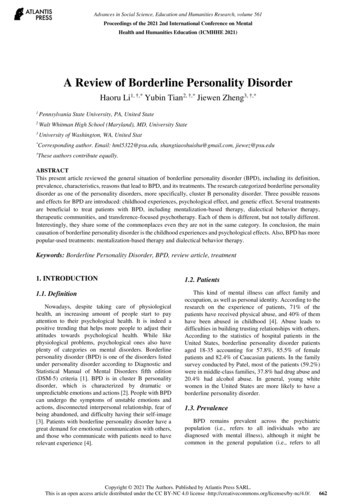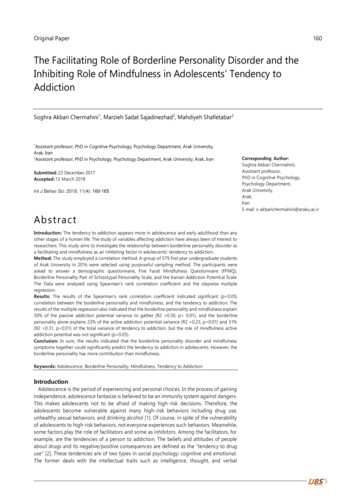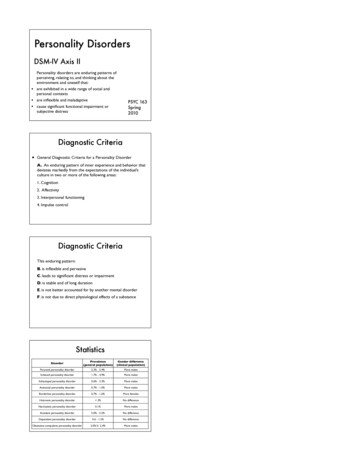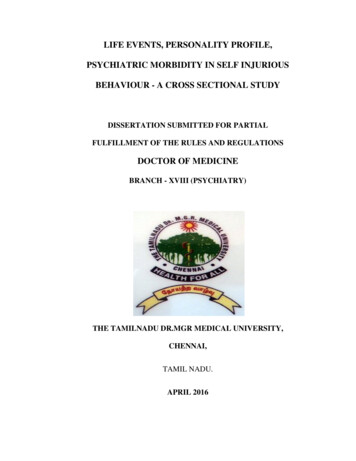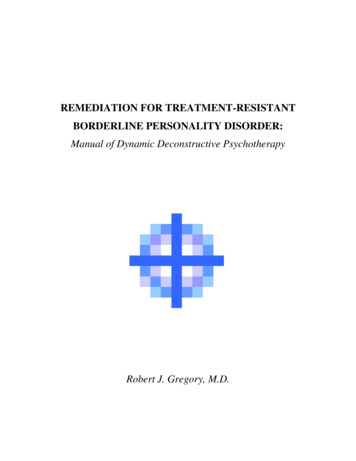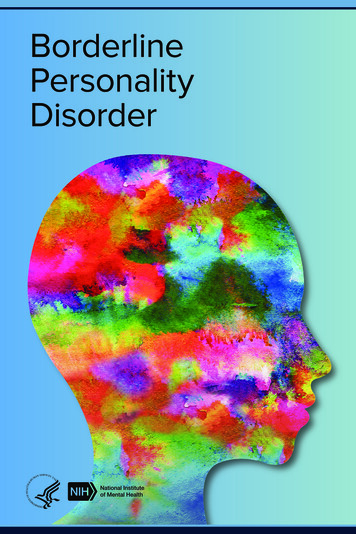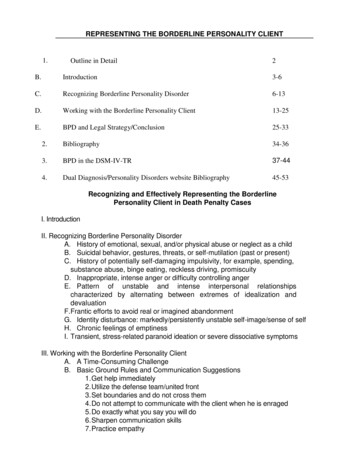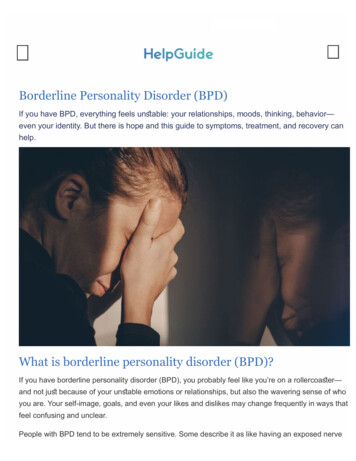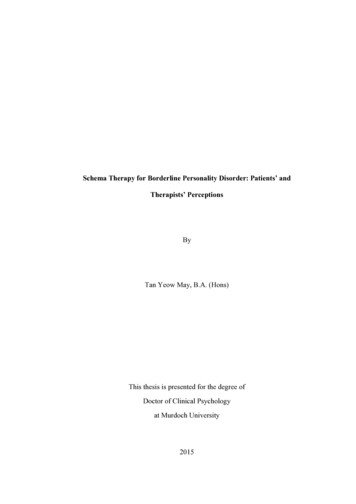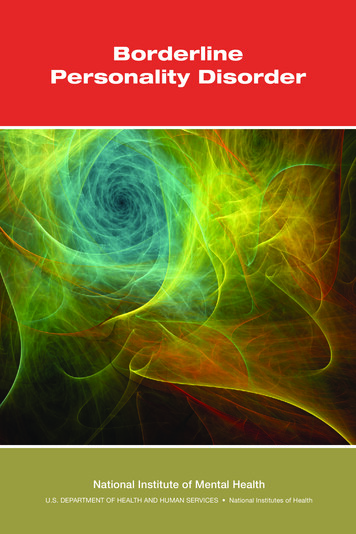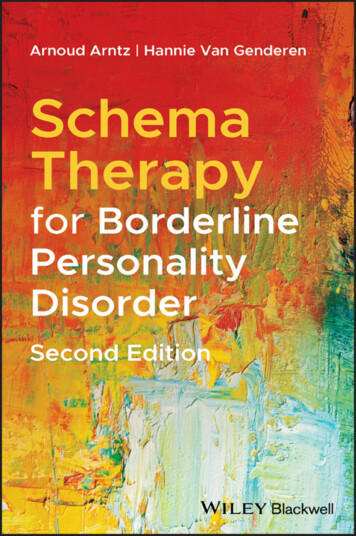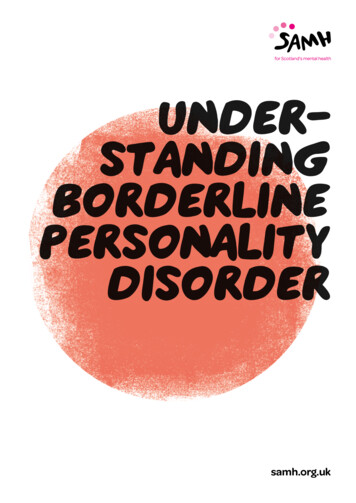
Transcription
.uk
contentsWhat is BPD? 04What causes BPD? 06What’s it like to live with BPD?08Could my diagnosis be wrong?12How can I help myself?14What treatments can help? 20How can other people help?This resource explainsborderline personalitydisorder (BPD), also known asemotionally unstablepersonality disorder (EUPD),including possible causes andhow you can access treatmentand support. it Includes tipsfor helping yourself,and guidance for friendsand family.24Useful contacts 26Further informationTo read or print SAMH’s information booklets visit samh.org.uk.If you require this information in word document format for compatibilitywith screen readers, please email communications@samh.org.ukFor more information visit: samh.org.uk3
Borderline personality disorderWhat is BPD?What is BPD?Borderline personality disorder (BPD) is a type of personality disorder.You might be diagnosed with a personality disorder if you have difficultieswith how you think and feel about yourself and other people, and arehaving problems in your life as a result.Different views on diagnosisBecause you only need to experiencefive of these difficulties to be given adiagnosis of BPD or EUPD, it can be a verybroad diagnosis which includes lots ofdifferent people with very differentexperiences.When is it diagnosed?You might be given a diagnosis of BPD ifyou experience at least five of the followingthings, and they’ve lasted for a long time orhave a big impact on your daily life:Some people find it helpful to have adiagnosis because they feel it explains andhelps people to understand theirdifficulties, or gives them a sense of reliefand validation. You feel very worried about peopleabandoning you, and would do anythingto stop that happening. You have very intense emotions that lastfrom a few hours to a few days and canchange quickly (for example, from feelingvery happy and confident to suddenlyfeeling low and sad). You don’t have a strong sense of whoyou are, and it can change significantlydepending on who you’re with. You find it very hard to make and keepstable relationships.4 You feel empty a lot of the time. You act impulsively and do things thatcould harm you (such as binge eating,using drugs or driving dangerously). You often self-harm or havesuicidal feelings. You have very intense feelings of anger,which are really difficult to control. When very stressed, you may alsoexperience paranoia or dissociation.‘Having BPD is likethe emotionalversion ofbeing a burn victim.Everything in theworld hurts morethan it seems tofor everyone elseand any ‘thick skin’you are supposedto have just isn’tthere.’‘I don’t necessarily tellpeople I have BPDbecause I don’t likelabelling myself, I justsay I have depression andanxiety because it’seasier. But I know I haveBPD. I feel things sointensely sometimes itmeans I lose control ofall my senses. It’s one ofthe worst feelings,but I have learnt how tocope with it.’Others feel their diagnosis isn’t helpful,disagreeing entirely with the current systemof diagnosing personality disorders andfinding it stigmatising and unhelpful.For example, some people prefer not todescribe their experiences as medicalproblems, or would rather see them as aresponse to difficult life events.‘EVen though I haven’t beenoffered much support,just having a diagnosis helpsme feel my suffering isvalidated.’For more information visit: samh.org.uk5
Borderline personality disorderWhat causes BPD?What causes BPD?There’s no clear reason why some people experience difficultiesassociated with BPD. More women are given this diagnosis than men,but it can affect people of all genders and backgrounds.Researchers think that BPD is caused by a combination of factors, including: stressful or traumatic life events genetic factorsStressful or traumatic life eventsIf you get this diagnosis you’re more likelythan most people to have had difficult ortraumatic experiences growing up, such as: often feeling afraid, upset, unsupportedor invalidated family difficulties or instability, suchas living with a parent who has anaddiction sexual, physical or emotional abuseor neglect losing a parent.If you had difficult childhood experienceslike these they may have caused you todevelop particular coping strategies,or beliefs about yourself and other people,which might become less helpful in timeand cause you distress. You might alsobe struggling with feelings of anger, fear orsadness.You might also experience BPD withouthaving any history of traumatic or stressfullife events, or you might have had othertypes of difficult experiences.If you already experience some of thesedifficulties, then experiencing stressor trauma as an adult could makethings worse.Genetic factorsSome evidence suggests that BPD couldhave a genetic cause, because you’re morelikely to be given this diagnosis if someonein your close family has also received it.But it’s very hard to know if difficultiesassociated with BPD are inherited fromyour parents or caused by other factors,such as the environment you grow up in orthe ways of thinking, coping and behavingthat you learn from the people around you.It’s possible that a combination of factorscould be involved. Genetics might makeyou more vulnerable to developing BPD,but often it’s due to stressful or traumaticlife experiences that these vulnerabilitiesare triggered and become a problem.Can children and young people bediagnosed with BPD?It’s very hard to diagnose BPD in childrenand young people because you go throughso many changes as you grow up. However,you might be given the diagnosis as ateenager if your difficulties have lasted forlong enough and BPD is the diagnosis thatbest matches what you are experiencing.‘Nobody taughtme to regulate myemotions. I saw myparents and familymembersregularly behavein out of controlways and Ithought thatwas normal.’‘One of the things I struggled with was afeeling of “why me”, in the sense of “othershave experienced far worse than me and candeal with it – why can’t I?”. Over time I’ve cometo realise that lots of low level issues inmy life are as valid a reason for strugglingas a few bigger traumas.’6For more information visit: samh.org.uk7
Borderline personality disorderWhat’s it like to live with BPD?What’s it like to live with BPD?Your experience of living with BPD will be unique to you, but this page describessome common experiences that you might recognise: difficult feelings and behaviourtowards yourself difficult feelings and behaviourtowards others alcohol and substance misuse BPD and other mental health problems experiences of facing stigma‘My experience is thatI have to keep myemotions inside, becauseI get told I amoverreacting. So I end upfeeling like I’m trappedinside my bodyscreaming while noone can hear me.’Difficult feelings and behaviourtowards yourselfHow you might think or feel: lonely overwhelmed by the strength of youremotions and how quickly they change like there is something inherently wrongwith you, and that it’s your fault if badthings happen to you because youdeserve them that you don’t know what you wantfrom life, or what you like or dislike like you’re a bad person, or not areal person at all like you are a child in an adult world.How you might behave as a result: self-harming or attempting suicide overspending or binge eating using recreational drugs, alcohol orsmoking to try to cope with youremotions quitting just before achieving something,or avoiding activities where you think youmight fail or be disappointed often changing jobs, hobbies, goalsor plans keeping very busy so you’re never alone.8Difficult feelings and behaviourtowards othersHow you might think or feel: that friends or partners will leave youforever if they are angry or upset with you like no one understands you, or you’renot like other people and will neverbe able to understand them that people are either completely perfectand kind, or bad and hurtful, and there’sno middle ground (this is sometimescalled splitting, or black-and-whitethinking) like the world is a scary and dangerousplace, and you want to run awayand hide.Alcohol and substance misuseSome people with BPD might be more likelyto misuse drugs and alcohol as a way oftrying to cope with the difficult emotionsthey experience. You can accessconfidential advice about drugs andalcohol on the FRANK website.For more information visit: samh.org.ukHow you might behave as a result: getting very angry or frustrated withpeople struggling to trust people wanting to be close to people butworrying they will leave or reject you,and so avoiding them having unrealistic expectations ofpeople or contacting them veryfrequently ending relationships with friends orpartners because you think they mightleave you anxiously looking out for signs thatpeople might reject you.‘BPD can beexhausting.My mind is aconstantrollercoasterof emotions butwhen theemotions arehappy andexhilarating it isthe bestfeeling in theworld.’9
Borderline personality disorderBPD and other mental health problemsIt’s common to experience othermental health problems alongside BPD,which could include: anxiety and panic attacks depression eating problems dissociative disorders psychosis bipolar disorder post-traumatic stress disorder(PTSD) or complex PTSDWhat type of bipolar is there?Experiences of facing stigmaBecause BPD is a complex diagnosis thatnot everyone understands well, you mightfind some people have a negative image ofit, or have misconceptions about you.This can be very upsetting and frustrating,especially if someone who feels this way is afriend, colleague, family member or a healthcare professional.But it’s important to remember that youaren’t alone, and you don’t have to put upwith people treating you badly. Here aresome options for you to think about::‘It took a longtime to get myBPD/EUPDdiagnosisbecause of alsohaving otherdisorders, butI’m at a happyplace now inlife thanksto a variety offactors.’ Show people this information to helpthem understand more about what yourdiagnosis really means. Get more involved in your treatment. Know your rights. Our pages on legalrights provide more information.‘The stigmais the worstfor me. I’m acaring andempathetic soulwho would doanythingfor the peopleI love.’10For more information visit: samh.org.uk11
Borderline personality disorderCould my diagnosis be wrong?Could my diagnosis be wrong?Some symptoms of BPD can be very similar to other mental healthproblems, including: bipolar disorder complex post-traumatic stressdisorder (PTSD) depression psychosis antisocial personality disorder (ASPD)Depending on your mood and what’sgoing on in your life when you speak to amental health professional, they might findit hard to understand which diagnosisbest fits your experiences and might offeryou treatment for something other thanBPD. It’s also possible to experienceBPD and other mental health problemsat the same time.What can I do if I disagree withmy diagnosis?If you’re worried that your diagnosis doesn’tfit the way you feel, it’s important to discussit with a mental health professional soyou can make sure you’re getting the righttreatment to help you.‘I had the wrongdiagnosis fornearly 30 yearsand felt likea freak, becausewhen readingup about thediagnosis I wasgiven there wasno mention of[my othersymptoms].’12For more information visit: samh.org.uk13
Borderline personality disorderHow can I help myself?How can I help myself?If you feel suicidalOur page on suicidal feelings includespractical tips on what you can do rightnow to help yourself cope. If you don’t feelable to keep yourself safe right now,seek immediate help: call 999 or call NHS 24 on 111 call Samaritans on freephone 116 123(open 24 hours a day) go to your nearest Accident andEmergency (A&E) department ring your GP or out of hours servicefor an emergency appointment contact your Community MentalHealth Team (CMHT)If you experience BPD you might feel likeevery day is a struggle, but in fact there arelots of things that could help, both nowand in the longer term.What can I do now?If you’re feeling overwhelmed, it might helpto focus on one feeling at a time. Here aresome ideas that you could try to see if theywork for you. Different things work atdifferent times for different people, so tryto be kind to yourself if some things don’twork for you. Over time, you might developyour own tips to add to this list too.‘Once properlydiagnosed,I knew thecause.I understoodthat I wassomeone withan illness. I wasnot a failure,not a badperson.’‘When I am in a really irritating andtriggering situation which I can’t get outof or change I just take it five minutesat a time. Breaking it into bite-size piecesmakes it possible.’14How you’refeelingWhat you could do to get through itangry,frustrated,restless rip up a newspaperhit a pillowthrow ice cubes into the bath so they smashdo some vigorous exerciselisten to loud musicdo a practical activity like gardening or woodwork.depressed,sad, lonely wrap up in a blanket and watch your favourite tv showwrite all your negative feelings on a piece of paper and tear it uplisten to a song or piece of music you find upliftingwrite a comforting letter to the part of yourself that is feeling sad or alonecuddle a pet or a soft toy.anxious,panicky,tense make yourself a hot drink and drink it slowly, noticing the taste andsmell, the shape of the mug and its weight in your hand take ten deep breaths, counting each one out loud write down everything you can think of about where you are right now,such as the time, date, colour of the walls and the furniture in the room take a warm bath or shower – this can help change yourmood by creating a soothing atmosphere and a distractingphysical sensation.dissociative,spaced out chew a piece of ginger or chili clap your hands and notice the stinging sensation drink a glass of ice cold water.wanting toself- harm rub ice over where you want to hurt yourself stick sellotape or a plaster on your skin and peel it off take a cold bath.For more information visit: samh.org.uk15
Borderline personality disorderHow can I help myself?What can I do in the longer term?If you experience BPD you might feel like every day is a struggle,but in fact there are lots of things that could help.You could: Talk to someone Keep a mood diary Plan for difficult times Make a self-care box Try peer support Look after your physical health Find specialist support for any connected issuesTalk to someoneIt can be hard to reach out when you’renot feeling well, but it might help to sharedifficult thoughts. If you don’t feel you cantalk to the people around you, you could trycontacting a helpline. For example,you can talk to Samaritans for free on 116123 or jo@samaritans.org about anythingthat’s upsetting you.16‘With time, youdo learn tocope with [BPD]better.I havestruggledfor 15 years,but every yearI seem to getstronger andbetter atcoping with it!’Keep a mood diaryRecording your moods in a diary could helpyou spot patterns in what triggers difficultexperiences for you, or notice early signsthat they are beginning to happen.You could also make a note of what’s goingwell. It’s really important to be kind toyourself and recognise difficult stepsyou’ve taken, or new things you’ve tried.Make a self-care boxYou could put together some thingsthat might help you when you’re struggling –a bit like making a first-aid kit for yourmental health.For example: favourite books, films or CDs a stress ball or fiddle toy helpful sayings or notes ofencouragement pictures or photos you find comforting a soft blanket or cosy slippers a nice-smelling candle or lavender bag‘There arepositive sidestoo; I believethat Iexperiencepleasantemotions morestronglythan others,and my friendsvalue mysincerity.’For more information visit: samh.org.uk17
Borderline personality disorderTry peer supportPeer support brings together people whohave had similar experiences. Some peoplefind this very helpful.There are lots of ways to find peer support.You could: look online for local peer support groups try an online peer support communitylike ElefriendsHow can I help myself?‘Although it cansometimes betriggering,going online andtalking to peoplewho also haveBPD is useful,supportive andreassuringthat I really amnot alone.’Look after your physical healthLooking after your physical health can makea difference to how you feel emotionally.For example, it can help to: Try to get enough sleep. Sleep can helpgive you the energy to cope with difficultfeelings and experiences. Think about your diet. Eating regularlyand keeping your blood sugar stable canmake a difference to your mood andenergy levels. Try to do some physical activity.Exercise can be really helpful for yourmental wellbeing. Spend time outside. Spending time ingreen space can boost your wellbeing. Avoid drugs and alcohol. While you mightwant to use drugs or alcohol to copewith difficult feelings, in the long run theycan make you feel a lot worse and canprevent you from dealing with anyunderlying problems that the drug oralcohol use may have been masking.Find specialist support forabuse or bullyingIf you’ve experienced other issues thathave contributed to your problems,such as abuse or bullying, it could behelpful to explore the help out there forthese too. If you have been abused inchildhood, the National Association forPeople Abused in Childhood is thereto support you.18For more information visit: samh.org.uk19
Borderline personality disorderWhat treatments can help?This page covers: talking therapies therapeutic communities medication accessing treatment experiences of treatment and recoveryTalking therapiesTalking therapies are thought to be themost helpful treatment for BPD, althoughmore research is needed into the types oftreatments that are most effective.The National Institute for Health and CareExcellence (NICE) – the organisation thatproduces guidelines on best practice inhealth care – suggests that the followingkinds of talking treatments may be helpful: Dialectical Behaviour Therapy(DBT) – uses individual and grouptherapy to help you learn skills to copewith difficult emotions. So far, NICE hasrecommended this treatment for womenwith BPD who often self-harm, andit’s also thought to be helpful for othergroups.20What treatments can help?‘DBT helped me hugelyto understand myself and myemotions, and to learn thatit’s all ok. No matterwhat is happening. it’sgoing to pass. For the firsttime in 10 years I’ve come offantidepressants andfeel great. I won’t ever be100% stable, but I can acceptmyself for who I am.’ Mentalisation-Based Therapy (MBT) –aims to help you recognise andunderstand your and other people’smental states, and to examine yourthoughts about yourself and others.You can read more about MBT on theNHS Choices pages on BPD.NICE says that other types of talkingtherapy could potentially be helpful,including: Cognitive Behavioural Therapy (CBT) –aims to help you understand how yourthoughts and beliefs might affectyour feelings and behaviour. Cognitive Analytic Therapy (CAT) –combines CBT’s practical methods witha focus on the relationship between youand your therapist. This can help you lookat how you relate to people, includingyourself, and what patterns havedeveloped for you. Other talking therapies – such asschema-focused cognitive therapy,psychodynamic therapy, interpersonaltherapy or arts therapies.Therapeutic communitiesTherapeutic communities are speciallydesigned programmes where you work witha group of other people experiencingmental health problems to support eachother to recover. You might live togethersome or all of the time, or meet up regularly.Activities can include different types ofindividual or group therapy, as well ashousehold chores and social activities.The Consortium for TherapeuticCommunities provides a directory oftherapeutic communities in the UK.‘I have educaTed myselfabout emotions, I havelearned from books,therapy, psychologists,friends. The mostimportant thing isthat it is never too lateto learn.’For more information visit: samh.org.uk21
Borderline personality disorderMedicationPsychiatric medication isn’t recommendedfor treating ongoing symptoms of BPD.This is because there aren’t any drugs thatare known to be effective. However,you might take medication for other mentalhealth problems you’re experiencing.In a crisis situation your doctor mightprescribe you a sleeping pill or minortranquilliser to help you feel calmer,but they shouldn’t prescribe these forlonger than a week.Medication really helps some people butisn’t right for others. Before deciding to takeany drug, it’s important to make sure youhave all the facts you need to makean informed choice.What treatments can help?How can I access treatment?To get treatment on the NHS you shouldvisit your GP, who can refer you to your localcommunity mental health team (CMHT)for an assessment.If you receive NHS treatment, it should be inline with NICE guidelines. These say that: Anyone with possible BPD should havea structured assessment with a specialistin mental health before being given adiagnosis. You should have a say in the type oftreatment you’re offered. If you’re notgetting the type of treatment you thinkwould most help you, it could help totalk to an advocate.You can read the full guidelines andadditional recommendations for BPD.Will I get the help I need in a crisis?Unfortunately, you might find that servicesin your area aren’t always able to providethe best possible care to support you.We know how frustrating and difficult it canbe to cope with services that don’t providethe exact help you need, exactly when youneed it. That’s why we’re campaigning toimprove crisis care across the country.‘It began changingfor me when onehospital suggestedthat there was away forward, that Ididn’t have tofeel so broken forever.It wasn’t plain sailingfrom there, butjust realising therewas hope. and thatother people had goneon to achieve amazingthings reallyinspired me.’‘I have found the rightmedication regime and tryto keep my life structured.It is not easy but recoveryis possible.’22Can I go private?Waiting times for talking therapies on theNHS can unfortunately be long. If you feelthat you don’t want to wait, or that youwould like to see a therapist who specialisesin the types of experiences you have had(which is often not available on the NHS),you may choose to see a therapistprivately.For more information visit: samh.org.uk23
Borderline personality disorderHow can other people help?How can other people help?If someone you care about is diagnosed with BPD you mightsometimes find it hard to understand their feelings or behaviour,or to know how to help. But there are lots of positive things youcan do to support them: Try to be patient. If your loved one isstruggling to deal with their emotions, trynot to get involved in an argument in theheat of the moment. It could be betterto wait until you both feel calmer to talkthings through. Don’t judge them. Try to listen to themwithout telling them that they’reoverreacting or that they shouldn’tfeel the way they do. Whether or notyou understand why they feel like this,and regardless of whether you feelit’s reasonable, it is still how they’re feelingand it’s important to acknowledge it. Be calm and consistent. If your lovedone is experiencing a lot ofoverwhelming emotions, this couldhelp them feel more secure andsupported and will help in momentsof conflict.24‘One thing thatI find helpsis whenothers validatemy emotions,as I often feelguilty forhaving them.’ Help remind them of all their positivetraits. When someone you care aboutis finding it hard to believe anything goodabout themself, it can be reassuring tohear all the positive things you seein them. Try to set clear boundaries andexpectations. If your loved one is feelinginsecure about being rejected orabandoned, or seems worried aboutbeing left alone, it can be helpful to makesure you both know what you can expectfrom each other. Plan ahead. When the person you’resupporting is feeling well, ask them howyou can help them best when thingsare difficult. See our pages on supportingsomeone who feels suicidal, andsupporting someone who is self-harmingfor more information. Learn their triggers. Talk to your lovedone and try to find out what sort ofsituations or conversations might triggernegative thoughts and emotions. Learn more about BPD, and help tochallenge stigma. BPD is acomplicated diagnosis, and your lovedone might sometimes have to dealwith other people’s misconceptionson top of trying to manage their mentalhealth problem.For more information visit: samh.org.uk Help them seek treatment and support. Help them find an advocate. Take care of yourself. Looking aftersomeone else can sometimes be difficultand stressful. It’s important toremember that your mental health isimportant too.25
Borderline personality disorderUseful contacts for work?Useful contactsBorderline ArtsHarmlessSamaritansE: contact@borderlinearts.orgW: borderlinearts.orgUses the arts to raise awareness ofborderline personality disorder.E: info@harmless.org.ukW: harmless.org.ukUser-led organisation for people whoself-harm, and their friends and families.Breathing SpaceThe National Association for PeopleAbused in Childhood (NAPAC)T: 116 123E: jo@samaritans.orgW: samaritans.orgFreepost RSRB-KKBY-CYJK,Chris, PO Box 90 90Stirling FK8 2SAA 24-hour free telephone helpline.T:0800 83 85 87W: breathingspace.scotListening service for people experiencinganxiety, depression or low mood.The Consortium for TherapeuticCommunitiesT: 01242 620 077W: therapeuticcommunities.orgProvides a directory of therapeuticcommunities in the UK.FRANKT: 0300 123 6600W: talktofrank.comFree 24-hour national drugs helpline.Give Us A ShoutT: 85258 ((text only)W: giveusashout.org24/7 crisis text line.26T: 0808 801 0331W: napac.org.ukA charity supporting adult survivors ofany form of childhood abuse. Provides asupport line and local support servicesNational Institute for Health andCare Excellence (NICE)W: nice.org.ukInformation and clinical guidelines onrecommended treatments for differentconditions, including BPD.See MeW: seemescotland.orgNational programme to tackle mentalhealth stigma and discrimination.The Survivors TrustT: 0808 801 0818W: thesurvivorstrust.orgSupport for adult survivors of any typeof childhood abuse, including localsupport groups.NHS InformW: nhsinform.scotInformation on medical conditions.Personality disorderW: personalitydisorder.org.ukInformation on personality disorder.For more information visit: samh.org.uk27
Since 1923, SAMH has representedthe voice of people affected bymental health problems in Scotland.We are here to provide help,information and support.Follow us on Twitter:@SAMHtweetsFollow us on Facebook:facebook.com/ SAMHmentalhealthFollow us on Instagram:@samhscotlandsamh.org.ukSAMH is the Scottish Association for Mental HealthScottish Charity: No. SC-008897Registered Office: Brunswick House, 51 Wilson Street, Glasgow, G1 1UZ
10 or more information visit: samh.org.uk 11 BPD and other mental health problems It's common to experience other mental health problems alongside BPD, which could include: anxiety and panic attacks depression eating problems dissociative disorders psychosis aren't alone, and you don't have to put up bipolar disorder post-traumatic stress disorder
